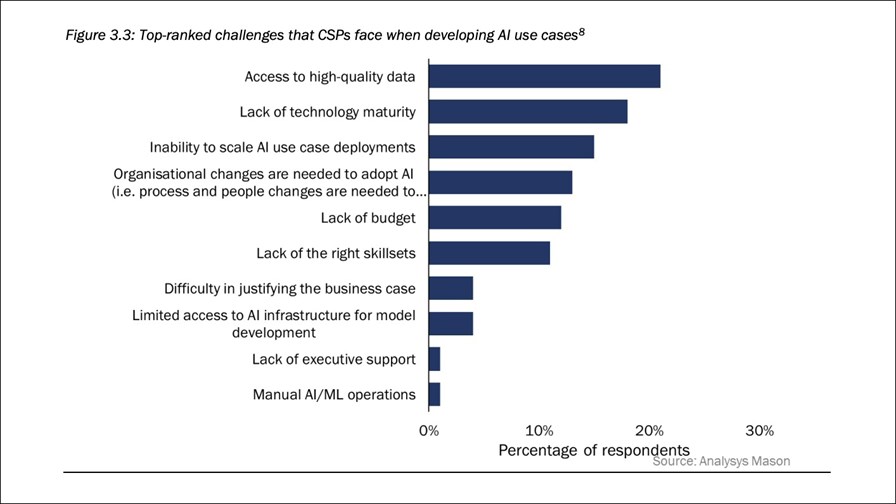
Source: Analysys Mason. Accelerating the adoption of telco AI to deliver autonomous networks - 2023 report
- New report from Analysys Mason pinpoints the main obstacles to telco AI use case developments
- Inaccessibility to high-quality data is the top challenge for numerous telcos globally
- This issue impacts operators’ ability to integrate AI into their networks and to retain much-needed talent
- Telcos are urged to assess their AI implementation strategies and tackle the data quality obstacle
The biggest challenge facing operators on their path to accelerated implementation of telco AI for the automation of their networks is the inability to access high-quality data, according to research undertaken by Analysys Mason.
The resulting report, Accelerating the adoption of telco AI to deliver autonomous networks, which was commissioned by Nokia, focuses on the current levels of automation across telecoms operators and the main barriers standing in the way of AI use case developments, despite ongoing investments.
The number one challenge telcos face when developing AI use cases is the lack of access to high-quality data, which can impede efforts to “effectively” deploy AI for network and service operations enhancements – this was highlighted by 21% of the 84 service provider survey respondents (see graph above).
“Current data infrastructures and processes are siloed, which makes it difficult for CSPs [communications service providers] to develop AI-driven use cases. In addition, data pipelines fail to provide the data needed to support AI model development at the time required or to the quality standards expected. CSP network infrastructure and systems have proprietary interfaces, and these affect the functions of these data pipelines, especially during the data collection stages,” according to the report’s author, Analysys Mason principal analyst Adaora Okeleke.
Additionally, nearly half of the respondents from tier-1 operators (those with annual revenues of more than $10bn) ranked data collection as the most challenging stage of the telco AI use case development cycle, taking into account the scale of network infrastructure they operate.
Furthermore, these data issues impact the ability of operators to integrate AI into their networks and to retain talent. Citing Verizon’s chief data officer and SVP, Linda Avery, the research noted that data scientists spend around 70% of their time accessing and preparing data, at the expense of deriving insights – and this makes them less motivated to remain in such environments.
Access to the required data sets and skillsets are also affecting the time to implement AI use cases, with the average duration taking between six and seven months, according to the report’s findings.
“CSPs must transition to more-autonomous operations if they are to manage networks more efficiently and deliver on their main business priorities. But as this research demonstrates, accessing high-quality data remains a critical obstacle to deploying telco AI within their networks. They need to really examine their AI implementation strategies to work around this data quality issue,” noted Okeleke.
Operators are advised to adopt an AI use case implementation blueprint that is driven by “the ease of access to data and the time that it takes to derive value”. They would also benefit from a clear blueprint for deploying AI use cases, from partnering with vendors with “the right skillsets”, modernising data infrastructure, using the cloud’s scalability to speed up deployments and targeting value-generating use cases.
The report is a timely one: Operators are scrambling to figure out the best way to automate multiple processes and develop a meaningful AI strategy, with some major telcos seeking to develop common approaches and platforms – see CSP giants form Global Telco AI Alliance.
The increasingly important role of AI in network operations, as well as service delivery and management, will be analysed and discussed during the upcoming AI-Native Telco Summit (18-19 October).
And the sector’s approach to AI was the source of heated discussions during the DSP Leaders World Forum 2023 session, Creating a framework for the AI-native telco – see Towards the AI-native telco.
- Yanitsa Boyadzhieva, Deputy Editor, TelecomTV




